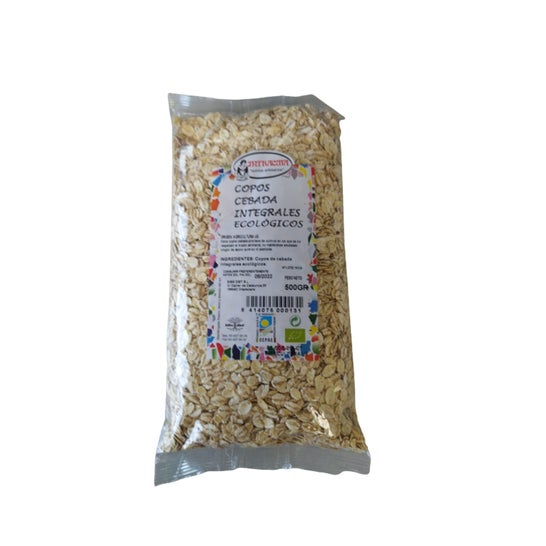Malt flakes, Intracma brand. They are rich in B vitamins, such as folic acid, and minerals such as potassium, phosphorus and magnesium. The greatest value lies in the fact that they contain important trace elements such as iron, sulphur, manganese, copper, zinc, iodine, chromium, selenium and molybdenum. It contains the amino acid lysine. It is an antioxidant and is necessary for muscle regeneration and recovery after injury. It stimulates the production of hormones, antibodies and enzymes. Barley inhibits the production of LDL or bad cholesterol and promotes the proper functioning of the digestive system and good health. It is detoxifying, diuretic, restorative, alkalizing and antiseptic. Intracma advises the regular intake of barley flakes in cases of chronic constipation and can be taken by everyone, although it is especially beneficial for growing children. They are not recommended for people with gluten intolerance.
Intracma Barley Flakes Eco 500g
€1.44 by redeeming Health points. Log in
![]() Sent from Spain
Show details
Sent from Spain
Show details
Enviado por DocMorris
Barley flakes rich in vitamins and trace elements
500 g
Shipping in 24-72h
€1.44 by redeeming Health points. Log in
![]() Sent from Spain
Show details
Sent from Spain
Show details
Enviado por DocMorris
Description
Instructions for use
Pour into a bowl and drink alone, with milk, juice or yoghurt.
Composition
Barley Flakes
Price per 100 G
Pharmaceutical Advice
Iron is a functional mineral that contributes to the body's growth and development. It is present in haemoglobin and myoglobin. These proteins transport oxygen from the lungs to the rest of the organism. Iron is also involved in the creation of hormones and connective tissue.
Our organism absorbs this mineral from foods such as seafood, lean meat, eggs, pulses and nuts. To facilitate its absorption, it is advisable to add acidic foods rich in vitamin C, such as orange or lemon juice, to the diet. A lack of iron in the diet can cause iron deficiency (anaemia). In the long term, it can lead to symptoms such as a constant lack of energy, fatigue, intestinal disorders and/or difficulty keeping body temperature under control. Lack of iron can be restored through a varied diet. If this is not enough, it can be mitigated through supervised supplementation. It is essential to follow the advice of a healthcare professional and always avoid taking an iron dietary supplement without checking if you are deficient in this mineral.
The body's iron requirements will change throughout the years. It is particularly important to regulate it during the years of menstruation, as well as in pregnant women and infants. Iron is also actively involved in development and growth and is therefore very important for newborn babies.
Safety and product information
Safety visual aids
At this time we do not have safety images for this product, but we are working on it. We encourage you to check back later for updates. In the meantime, we recommend that you read the safety information that comes with the product before using it. If you have any questions about safety, please do not hesitate to contact us. Also, if you wish, you can also return the product by following our terms and conditions.
Manufacturer details
At the moment we do not have the manufacturer's details, but we are working to add them as soon as possible. We invite you to check back later for updates. If you have any questions, please do not hesitate to contact us, we will be happy to help you.
RELATED SEARCHES ABOUT Food
New in Nutrition
- Health4U Aceite Onagra Special Edition 60caps
- Granions Minceur & Beauté Proteínas Vegetales + Colágeno 275 g
- Pranarôm Aromaforce Ola de Frío 9x2 g
- Nat&Form Cromo 200µg 60 Perlas
- Marnys Pack Spray Propóleo + Propolsaft Plus 12 Sticks
- Granions Hydrop Collagen Frambuesa Casis 18comp
- Mium Lab Gummies Sueño 42uds
- Granions Spray Sueño Flash Melatonina 1,9mg 25 ml
- 226Ers Energy Shot Stick Xtrem 250mg Cafeína Banana 60 ml
- Corny 30 % Protein Crunchy Vainilla 45 g

